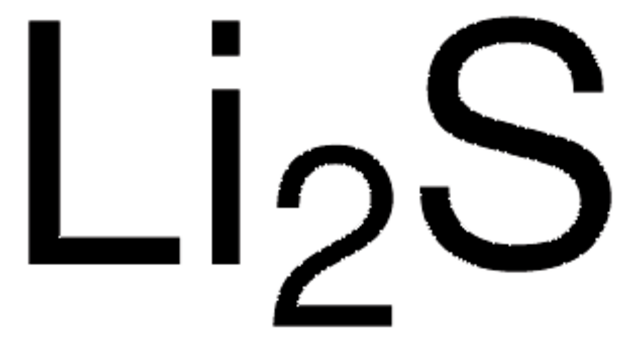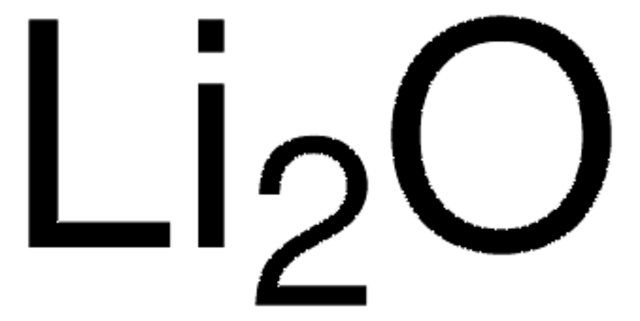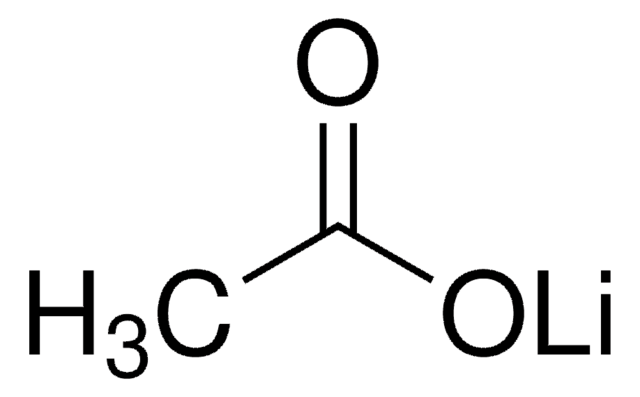920339
Lithium sulfate
anhydrous, 99.5% trace metals basis
Sinónimos:
″Sulfuric acid, dilithium salt″, Dilithium sulfate, Lithium sulphate
About This Item
Productos recomendados
grado
anhydrous
Nivel de calidad
Análisis
99.5% trace metals basis
formulario
crystals
características de los productos alternativos más sostenibles
Design for Energy Efficiency
Learn more about the Principles of Green Chemistry.
sustainability
Greener Alternative Product
mp
845 °C (lit.)
densidad
2.22 g/mL at 25 °C (lit.)
categoría alternativa más sostenible
cadena SMILES
[Li+].[Li+].[O-]S([O-])(=O)=O
InChI
1S/2Li.H2O4S/c;;1-5(2,3)4/h;;(H2,1,2,3,4)/q2*+1;/p-2
Clave InChI
INHCSSUBVCNVSK-UHFFFAOYSA-L
¿Está buscando productos similares? Visita Guía de comparación de productos
Descripción general
Lithium sulfate is an anhydrous lithium salt with excellent water. It is used as a source of lithium ions in lithium-ion batteries, which are widely used in portable electronic devices and electric vehicles due to their high energy density and long cycle life. In fuel cells, lithium sulfate can be used as an electrolyte material due to its ionic conductivity, which is essential for the efficient operation of the fuel cell.
Aplicación
- Used as an additive in lead acid batteries. The addition of lithium sulfate improves the cycle life and the efficiency of lead-acid batteries, which are used in various industries, including automotive and energy storage.
- Used in the fabrication of thin-film solar cells. It can be employed as a dopant to improve the performance of cadmium sulfide (CdS) thin-film solar cells by enhancing their electrical properties.
- Used in the production of lithium-ion batteries. It is a precursor in the synthesis of lithium iron phosphate (LiFePO4) cathode materials, which are widely used in lithium-ion batteries for their high energy density, long cycle life, and enhanced safety.
- Used as an electrolyte in the electrochemical characterization of synthesized a-MnO2 for supercapacitor applications.
Palabra de señalización
Warning
Frases de peligro
Consejos de prudencia
Clasificaciones de peligro
Acute Tox. 4 Oral - Eye Irrit. 2
Código de clase de almacenamiento
13 - Non Combustible Solids
Clase de riesgo para el agua (WGK)
WGK 1
Punto de inflamabilidad (°F)
Not applicable
Punto de inflamabilidad (°C)
Not applicable
Certificados de análisis (COA)
Busque Certificados de análisis (COA) introduciendo el número de lote del producto. Los números de lote se encuentran en la etiqueta del producto después de las palabras «Lot» o «Batch»
¿Ya tiene este producto?
Encuentre la documentación para los productos que ha comprado recientemente en la Biblioteca de documentos.
Nuestro equipo de científicos tiene experiencia en todas las áreas de investigación: Ciencias de la vida, Ciencia de los materiales, Síntesis química, Cromatografía, Analítica y muchas otras.
Póngase en contacto con el Servicio técnico






